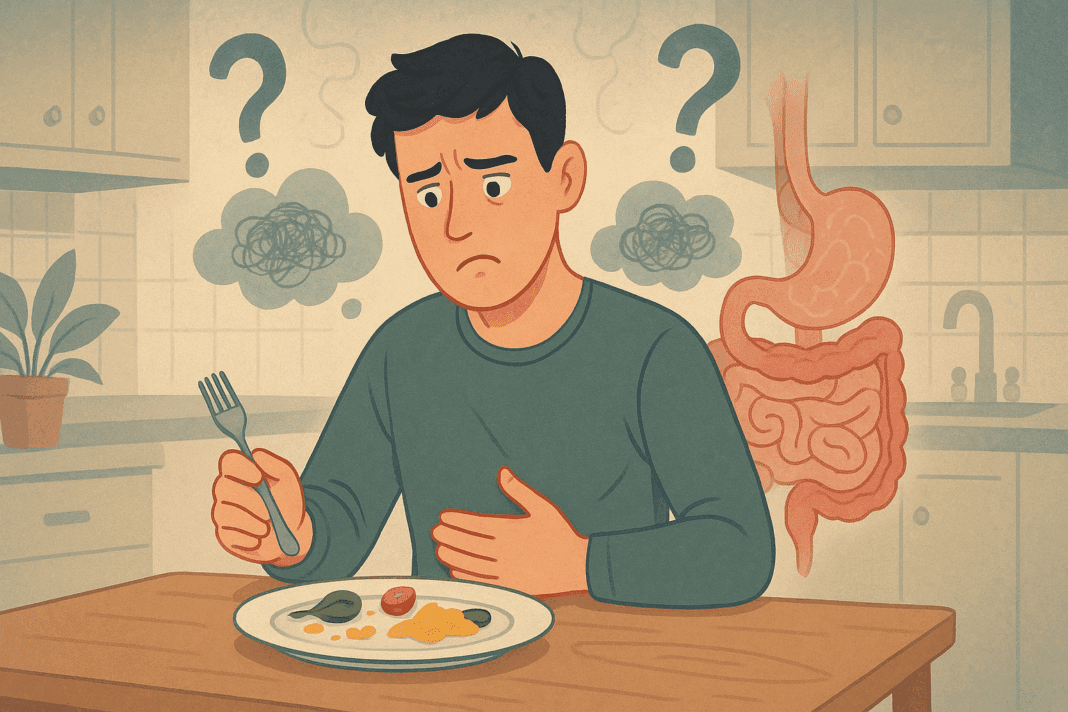Eating is one of the most instinctive acts of daily life. Whether out of necessity, habit, or pleasure, the act of nourishing our bodies connects us to an intricate web of physiological processes. But what happens when this routine act leaves you with an unsettling, hollow sensation in your gut? Many people experience what feels like an empty stomach feeling even shortly after meals, leading to questions such as, “Why does my stomach feel empty even after eating?” or “What causes hunger pains when I just ate?” These experiences can be disorienting, especially when paired with hunger pangs or appetite changes that don’t seem to make sense.
You may also like: How to Stop Emotional Eating and Regain Control: Mindful Nutrition Strategies That Support a Healthier Lifestyle
Understanding these phenomena requires diving deeper into the relationship between the brain, digestive system, hormones, and emotional health. While hunger is a natural biological signal, persistent or unexplained sensations like constant hunger pains, excessive appetite, or even a sudden lack of appetite with hunger pangs can sometimes indicate underlying imbalances that need attention. Through this article, we will explore the potential causes behind these conflicting signals, explain the science of hunger, and provide practical insights into how to manage and interpret these bodily cues.
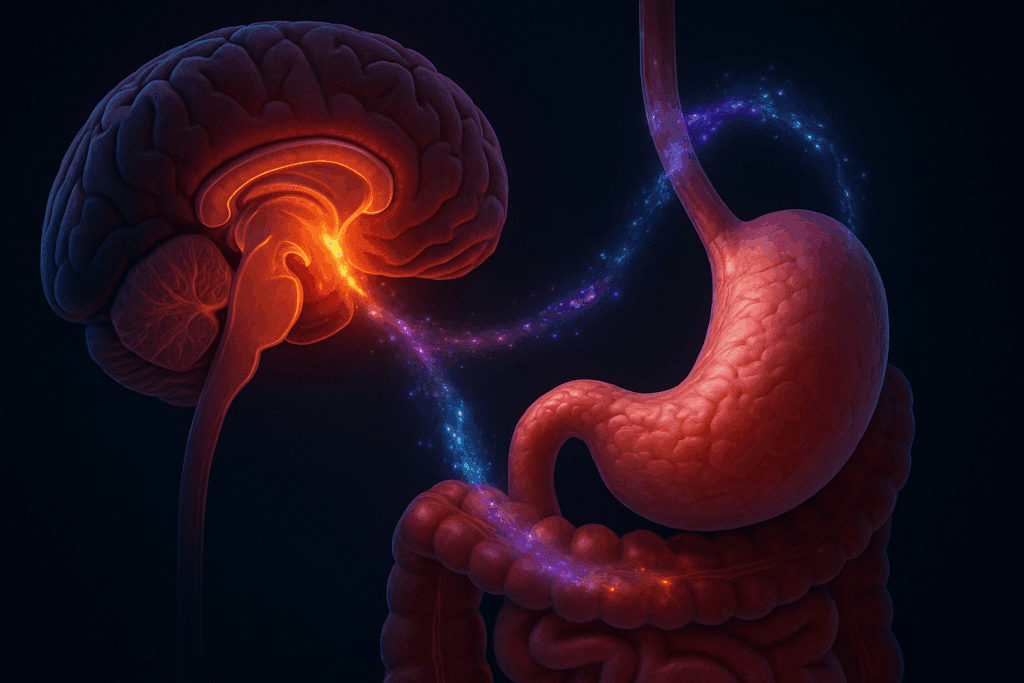
The Physiology of Hunger and Fullness
Hunger and fullness are carefully regulated by a symphony of signals between the brain and the gut. At the center of this interaction is the hypothalamus, a region of the brain that integrates hormonal and neural inputs to decide whether or not the body needs fuel. Hormones such as ghrelin, which stimulates appetite, and leptin, which signals satiety, play central roles in this regulation. When everything is functioning optimally, these hormones help us maintain energy balance.
However, the sensation of hunger is not always purely physical. Emotional, environmental, and psychological factors can amplify or suppress these signals. For example, extreme hunger can be triggered by emotional stress, even when the body has had enough caloric intake. Likewise, a person may feel full but still experience hunger pangs due to habitual eating patterns or social triggers. This complexity is what often leads to scenarios where one might feel hunger pains but not hungry in the traditional sense. Such sensations highlight the non-linear and multi-dimensional nature of hunger regulation.
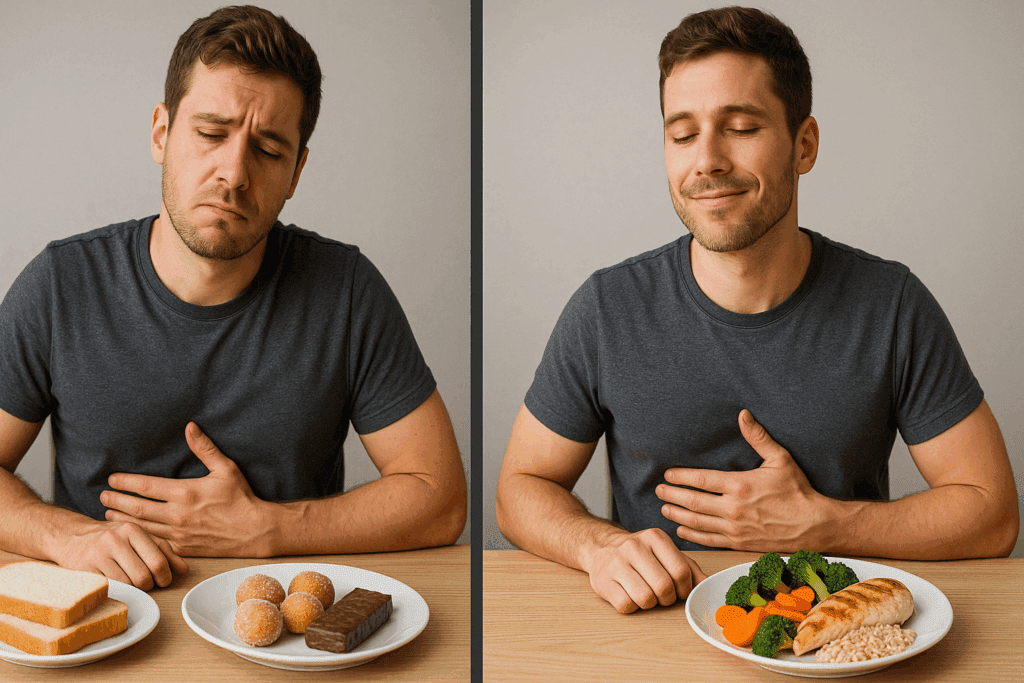
Empty Stomach Feeling: When Hunger Persists After Eating
Perhaps one of the most frustrating experiences is dealing with a persistent empty tummy feeling after a substantial meal. This sensation can manifest as a dull ache, a hollow pressure, or even mild nausea, making a person question the adequacy of their meal. For some, it may coincide with stomach ache from not eating, even though food was just consumed. This paradox can stem from several causes.
First, the type of food consumed plays a vital role. Meals high in refined carbohydrates and low in fiber and protein can cause a rapid spike and drop in blood sugar, leading to a return of hunger signals even when the stomach isn’t empty. Second, digestive speed varies by individual. For some, slow gastric emptying (gastroparesis) may cause fullness to persist; for others, rapid digestion might leave them feeling empty too soon.
Psychological factors such as anxiety, chronic stress, and eating disorders can also contribute. In such cases, individuals may develop an insatiable appetite or describe painful hunger pains after eating, despite having ingested sufficient calories. This emotional component blurs the lines between physical hunger and emotional cravings, complicating the interpretation of body signals.
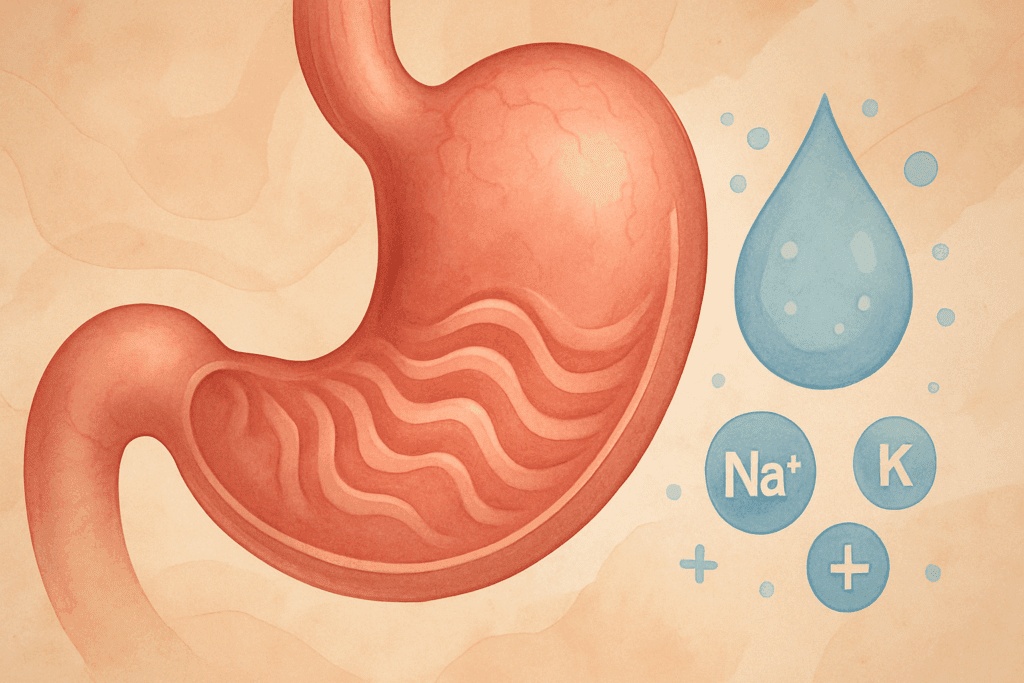
What Causes Hunger Pains and Hunger Pangs?
The terms “hunger pains” and “hunger pangs” are often used interchangeably to describe the discomfort or cramping sensations in the stomach that signal the need for food. These feelings are typically caused by contractions in the stomach muscles, also known as migrating motor complexes, which occur when the stomach is empty. However, these contractions can sometimes be triggered even when the stomach contains food.
What causes hunger pangs in such cases often relates to how quickly the stomach processes its contents or how sensitive an individual’s digestive system is to these contractions. Additionally, dehydration and electrolyte imbalances can mimic or amplify these sensations, leading people to feel symptoms of hungry even when their dietary intake is adequate.
Certain conditions can intensify these sensations. For example, people with hypoglycemia (low blood sugar) may experience hunger pangs after eating as a rebound effect when insulin levels spike and then crash. In other cases, gastrointestinal infections or conditions like gastritis can produce pain in the stomach that feels like hunger, even though it originates from inflammation rather than nutritional need.

Excessive Hunger: When Appetite Goes Into Overdrive
Experiencing hunger is normal, but when the body demands food beyond its needs, the sensation shifts into excessive appetite territory. This can manifest as frequent, intense cravings or a sudden increase in appetite and fatigue in females or males alike. Often, this imbalance is referred to by the excessive hunger medical term “polyphagia,” which is commonly associated with metabolic or endocrine conditions such as diabetes, hyperthyroidism, or even pregnancy.
Excessive appetite can also stem from psychological roots. Chronic stress prompts the release of cortisol, a hormone that increases cravings for high-fat, high-sugar foods. Emotional trauma and conditions like depression or anxiety may also lead individuals to experience constant hunger pains, even after a full meal. This might be confused with genuine caloric need, making it more difficult to assess nutritional adequacy.
People often wonder what you call a person with huge appetite, especially when this seems abnormal or compulsive. While having a large appetite can be harmless or culturally normalized, a persistently insatiable appetite may point toward dysregulated hunger signals or emotional reliance on food. Understanding the distinction is key to determining whether medical evaluation is necessary.
Hunger Without Appetite: A Conflicting Message
While some struggle with overeating, others face the confusing reality of having no appetite with hunger pangs. This paradoxical experience can be distressing, particularly when accompanied by other symptoms like nausea, fatigue, or irritability. It often occurs during periods of emotional upheaval, illness, or medication use.
Certain infections, such as gastrointestinal viruses, can suppress appetite while triggering stomach contractions that mimic hunger. Similarly, chronic illnesses like cancer, kidney disease, or autoimmune disorders may reduce appetite while still stimulating hormonal cues that lead to hunger pangs. Mental health conditions, particularly anxiety and depression, can further disrupt the alignment between appetite and actual nutritional needs.
In such scenarios, individuals may feel pain in the stomach that feels like hunger but struggle to consume food due to a psychological or physical aversion. The result is a troubling cycle in which not eating leads to stomach hurts, which in turn makes it more difficult to eat. This cycle can create long-term nutritional deficits if not addressed appropriately.
Identifying the Symptoms of Hungry: What to Watch For
Understanding the symptoms of hungry is essential for distinguishing between normal appetite cues and signs of underlying issues. Classic symptoms include stomach rumbling, light-headedness, irritability, and a gnawing sensation in the gut. However, these signs can also be influenced by non-nutritional factors, including emotional states, hydration levels, and sleep quality.
One of the challenges in assessing hunger is that the sensation can vary significantly from person to person. Some individuals experience hunger pains but not hungry in the conventional sense—they may feel pressure or discomfort in the stomach without the desire to eat. Others may mistake thirst for hunger, leading to unnecessary caloric intake.
More concerning is the persistent or extreme hunger that is not satisfied by food. This may indicate hormonal dysregulation, such as leptin resistance, or could be a sign of an undiagnosed medical condition. Monitoring the frequency, intensity, and duration of these hunger pangs symptoms can provide valuable insight for healthcare professionals seeking to determine what illness causes constant hunger.
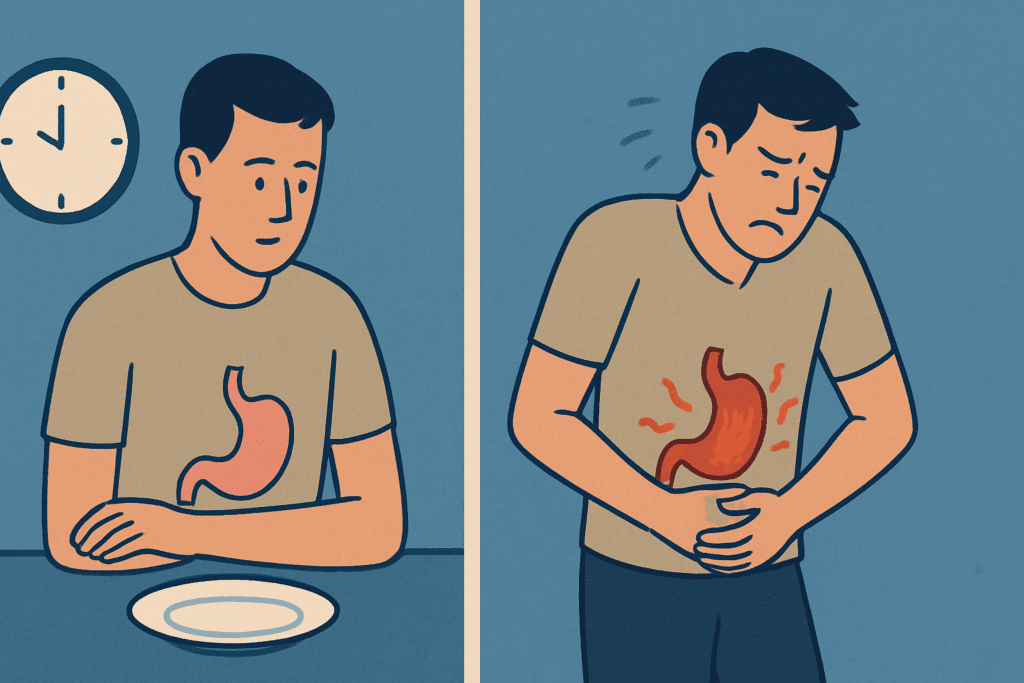
Stomach Ache from Not Eating: How Fasting or Skipping Meals Affects the Gut
In recent years, intermittent fasting has gained popularity as a wellness strategy. However, for some individuals, skipping meals can lead to discomfort, cramping, or a stomach ache from not eating. This pain arises from prolonged gastric acid production and the contraction of an empty stomach. While mild symptoms are normal during fasting, persistent or intense discomfort may indicate hypersensitivity or pre-existing digestive conditions.
Those with a history of ulcers, gastritis, or acid reflux may be more prone to experiencing painful hunger pains after eating or during extended periods without food. This reaction can also result from a diet low in fiber and essential nutrients, which fails to buffer the stomach lining. Additionally, not eating can cause blood sugar levels to drop, leading to dizziness, fatigue, and the perception of an empty stomach feeling even after eating.
Reintroducing food too quickly after fasting or skipping meals can also shock the digestive system. It is crucial to ease back into eating with small, nutrient-dense portions that support stable energy and hormone levels. For individuals practicing fasting, professional guidance can ensure that hunger cues are interpreted correctly and that digestive health is preserved.
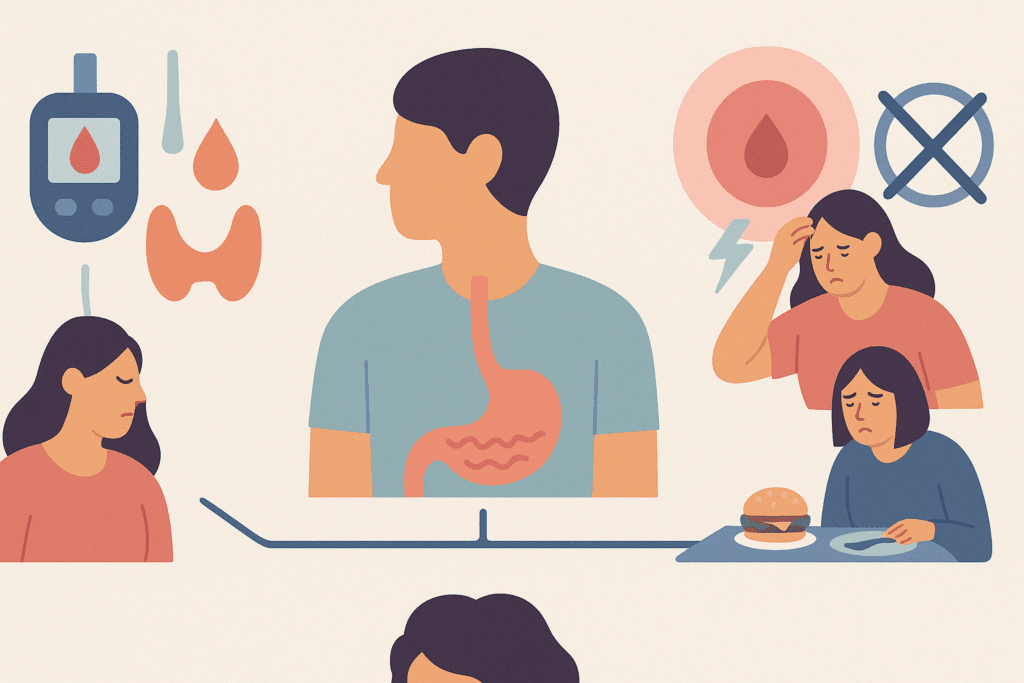
Medical and Psychological Conditions That May Explain Persistent Hunger
Persistent hunger, when not addressed by typical dietary changes, may indicate a deeper health issue. As previously mentioned, polyphagia is a hallmark symptom of several metabolic and endocrine disorders, including type 1 and type 2 diabetes, hyperthyroidism, and hypoglycemia. These conditions disrupt the body’s ability to regulate glucose, often resulting in excessive hunger and fatigue.
In women, a sudden increase in appetite and fatigue may also signal hormonal fluctuations related to menstruation, pregnancy, or menopause. Hormones like estrogen and progesterone affect appetite-regulating pathways in the brain and may amplify hunger signals at different stages of the reproductive cycle. Recognizing these patterns can help women manage symptoms more effectively through tailored nutrition and lifestyle practices.
On the psychological front, eating disorders such as binge eating disorder (BED) or bulimia nervosa often involve cycles of extreme hunger and overeating. These conditions require comprehensive mental health support and nutritional therapy to restore healthy eating behaviors. In many cases, people who struggle with emotional eating may not even realize they are using food as a coping mechanism, further blurring the line between true hunger and emotional need.
When to Seek Help for Unusual Hunger Patterns
Most people experience fluctuations in appetite throughout their lives, but recurring or disruptive symptoms deserve medical attention. Individuals who frequently wonder “Why do I feel empty in my stomach?” or who experience hunger pangs after eating should consider tracking their meals, mood, and physical symptoms to identify patterns. This information can be invaluable to healthcare professionals when diagnosing potential digestive, endocrine, or mental health conditions.
Sudden weight gain or loss, mood changes, digestive upset, or persistent fatigue accompanying changes in hunger should also prompt a medical evaluation. In many cases, addressing underlying health issues—from thyroid imbalances to gut inflammation—can restore normal appetite signals and eliminate the discomfort of constant hunger pains.
Nutritional counseling, behavioral therapy, and laboratory testing are often part of a holistic approach to resolving unexplained appetite changes. By combining physical and psychological care, individuals can regain confidence in their body’s signals and achieve greater peace of mind in their eating habits.

Making Peace with Your Appetite: Holistic Strategies for Mindful Eating
In our culture of quick fixes and diet trends, learning to listen to the body’s hunger cues can feel revolutionary. Practicing mindful eating—slowing down, savoring food, and checking in with how you feel before, during, and after meals—can help recalibrate disordered eating patterns. Rather than fearing hunger or feeling guilt over appetite, individuals can learn to embrace eating as a necessary and pleasurable act of self-care.
Including balanced macronutrients at every meal—protein, healthy fats, and fiber-rich carbohydrates—can stabilize blood sugar and reduce the likelihood of hunger pains but not hungry. Hydration also plays a crucial role. Drinking water throughout the day can prevent mistaking thirst for hunger, a common mistake that contributes to excessive eating.
Equally important is addressing the emotional dimension of hunger. Keeping a food journal, practicing stress reduction techniques like yoga or meditation, and seeking therapy when needed can all support a healthier relationship with food. This integrated approach not only helps diminish empty tummy feelings but also promotes long-term emotional and physical well-being.
Frequently Asked Questions: Understanding Hunger Pains, Appetite Changes, and the Persistent Empty Stomach Feeling
Why do I still feel hungry after eating a full meal?
Feeling a persistent empty stomach feeling even after eating can stem from a mismatch between satiety hormones and your brain’s perception of fullness. In some cases, high-glycemic foods spike insulin rapidly, leading to a rebound drop in blood sugar that triggers renewed hunger pangs shortly after eating. This sensation may also arise when meals are low in fiber or protein, which are essential for sustained satiety. Another often overlooked factor is psychological conditioning, where habits and emotional associations with food override physiological cues. People who experience hunger pangs after eating may benefit from keeping a meal journal to identify patterns and testing different food compositions to see what creates the most lasting fullness.
Can stress cause hunger pains even if I’m not actually hungry?
Yes, emotional and psychological stress can lead to hunger pains but not hungry in the traditional sense. This phenomenon is largely driven by the hormone cortisol, which is released in response to stress and can heighten the perception of hunger and cravings for comfort foods. These feelings are real and often mirror the symptoms of hungry, such as stomach churning or an empty tummy feeling, even in the absence of nutritional need. In high-stress environments, the brain may misinterpret signals from the body, prompting cravings that mimic hunger pangs. Long-term stress management strategies like mindfulness, exercise, and adequate sleep can significantly reduce these misaligned hunger cues.
What are some medical causes of extreme hunger that should not be ignored?
While temporary increases in appetite can occur naturally, persistent extreme hunger should raise some red flags. One possible underlying condition is hyperthyroidism, which accelerates metabolism and increases food needs. Another is diabetes, where glucose regulation is impaired, often leading to constant hunger pains due to inefficient cellular fuel usage. Women experiencing a sudden increase in appetite and fatigue—especially if it is cyclic—may be dealing with hormonal fluctuations such as perimenopause or PCOS. If you are wondering what illness causes constant hunger, comprehensive bloodwork can help uncover imbalances in glucose, thyroid hormones, and adrenal function.
Is it normal to have no appetite with hunger pangs?
This paradoxical situation, where there is no appetite with hunger pangs, can be both confusing and concerning. It often occurs during emotional distress, illness, or when dealing with gastrointestinal issues. For example, individuals experiencing nausea, depression, or the early stages of viral infections may have physical sensations resembling hunger—such as an ache or pain in the stomach that feels like hunger—while feeling mentally averse to eating. The disconnect between physical signals and psychological readiness for food is often a sign that the body is under duress. In such cases, focusing on hydration, rest, and small, nutrient-dense snacks can help restore appetite gradually.
What should I do if I regularly wake up with hunger pains?
Waking up with hunger pangs can indicate that your body is either not getting enough calories during the day or that your blood sugar is dropping overnight. This pattern often accompanies symptoms like irritability, dizziness, or a stomach ache from not eating. One strategy is to ensure your dinner includes slow-digesting carbohydrates, lean protein, and healthy fats to provide a sustained release of energy overnight. If you still experience painful hunger pains after eating at night, it may be worth evaluating your sleep quality and nighttime eating habits. Blood sugar instability, sleep apnea, or even increased nighttime cortisol levels could contribute to these early morning hunger pangs symptoms.
Why do I feel hunger pangs after eating something small?
If you’re experiencing hunger pangs after eating, especially after small or light meals, it might be due to a lack of bulk or inadequate nutrient content. Meals that lack sufficient fiber and protein often fail to activate long-term satiety hormones like peptide YY and GLP-1. Additionally, fast-digesting foods are cleared from the stomach quickly, leaving behind the sensation of an empty tummy feeling. This can lead to a cycle of frequent snacking and hunger pains but not hungry sensations, as the body craves nourishment without a stable metabolic baseline. Opting for balanced meals and spacing them strategically can break this loop and stabilize hunger signals.
Could my medications be causing changes in my appetite or stomach sensations?
Absolutely. Several classes of medications are known to influence hunger cues and digestive sensations. For instance, corticosteroids can trigger excessive appetite and contribute to an insatiable appetite in some individuals. Meanwhile, SSRIs and other antidepressants may suppress appetite or create gastrointestinal discomfort that mimics hunger pains. Even medications used for blood pressure or hormonal regulation may create side effects that lead to an empty stomach feeling or stomach ache from not eating. It’s important to track changes in appetite when starting or stopping a new medication and to consult with a healthcare provider about alternative treatments if these symptoms persist.
What do I call someone who always seems hungry regardless of what they eat?
In colloquial terms, you might refer to this person as having a “bottomless pit” or say they “eat like a horse,” but in medical contexts, excessive appetite may be labeled as polyphagia. If you’re wondering what you call a person with huge appetite, this term describes individuals who experience frequent, often uncontrollable urges to eat, sometimes accompanied by a failure to feel satisfied. This could be due to metabolic factors, behavioral habits, or psychological conditions. When this pattern becomes disruptive to daily life or leads to health complications, a full medical and psychological evaluation is often warranted. Lifestyle coaching, therapy, and dietary adjustments can help re-establish a sense of control and body awareness.
Why does not eating make my stomach hurt so badly sometimes?
Experiencing pain when you skip meals is not uncommon and may be a sign of increased stomach acid activity or hypersensitive gastric tissue. When the stomach remains empty for extended periods, acid continues to be secreted, which can irritate the stomach lining and result in a stomach ache from not eating. Over time, this can lead to gastritis or even ulcers in sensitive individuals. If you consistently find that not eating stomach hurts, especially if the pain disrupts your routine or leads to nausea, medical assessment is essential. Eating small, regular meals and avoiding irritants like caffeine and alcohol may provide relief while you seek long-term solutions.
How can I tell the difference between real hunger and emotional cravings?
Distinguishing real hunger from emotional cravings requires tuning into subtle physiological and psychological cues. Genuine hunger tends to build gradually and is associated with common symptoms of hungry such as stomach growling, low energy, and an empty stomach feeling. Emotional cravings, on the other hand, often appear suddenly and are specific to comfort foods, typically high in sugar or fat. These cravings might occur even shortly after eating, leaving individuals puzzled by their insatiable appetite. Keeping a food-mood journal and practicing mindful eating can help develop a clearer understanding of what causes hunger pains and whether they stem from biological need or emotional states.
Key Takeaways on Hunger Pangs, Appetite Changes, and That Empty Stomach Feeling
The human appetite is an intricate tapestry woven from biology, psychology, and lifestyle. The sensation of an empty stomach feeling, even after eating, can arise from a variety of factors—some harmless, others requiring medical attention. Recognizing symptoms like hunger pangs after eating, no appetite with hunger pangs, or pain in the stomach that feels like hunger is the first step toward understanding your body’s needs more deeply.
By exploring the root causes behind constant hunger pains or an insatiable appetite, individuals can take control of their health, improve their dietary habits, and seek appropriate medical support when needed. Whether the source is emotional, hormonal, nutritional, or medical, the tools for healing often begin with awareness and education. Embracing a mindful, compassionate approach to eating and appetite helps transform confusion and discomfort into clarity and empowerment—one bite at a time.
Was this article helpful? Don’t let it stop with you. Share it right now with someone who needs to see it—whether it’s a friend, a colleague, or your whole network. And if staying ahead on this topic matters to you, subscribe to this publication for the most up-to-date information. You’ll get the latest insights delivered straight to you—no searching, no missing out.
Further Reading:
Feeling Hungry After Eating: Why It Happens and What to Do
Disclaimer
The information contained in this article is provided for general informational purposes only and is not intended to serve as medical, legal, or professional advice. While NewsHealthWatch strives to present accurate, up-to-date, and reliable content, no warranty or guarantee, expressed or implied, is made regarding the completeness, accuracy, or adequacy of the information provided. Readers are strongly advised to seek the guidance of a qualified healthcare provider or other relevant professionals before acting on any information contained in this article. NewsHealthWatch, its authors, editors, and contributors expressly disclaim any liability for any damages, losses, or consequences arising directly or indirectly from the use, interpretation, or reliance on any information presented herein. The views and opinions expressed in this article are those of the author(s) and do not necessarily reflect the official policies or positions of NewsHealthWatch.

